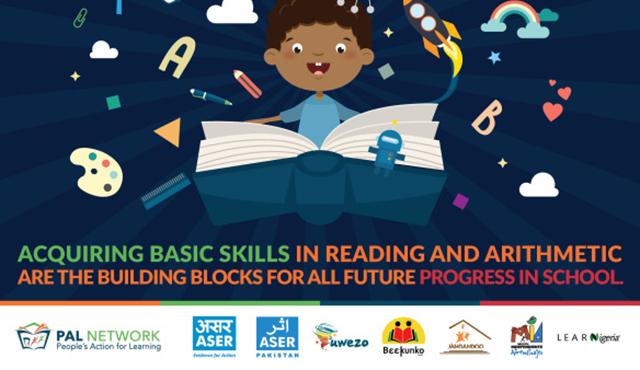By Hannah-May Wilson, Program Manager, PAL Network Secretariat

What a difference a year makes. Last week in Nairobi, when we woke to find a grey blanket of fog wrapped around our conference centre, it was hard to believe that only a year ago, the founding directors of our citizen-led assessment movement set up the People’s Action for Learning (PAL) Network. The Network is a south-south partnership whose member countries carry out sample-based, citizen-led assessments to measure the learning levels of all children in their own homes, regardless of their age, gender, or whether they go to school or not.
The first Steering Committee meeting of the PAL Network was held in the wake of the World Education Forum 2015 where the Incheon Declaration committed Ministries of Education worldwide to provide inclusive and equitable quality education and lifelong learning for all. Just two months later, 193 world leaders meeting in New York pledged to ensure that all children learn the basics by 2030, with no child left behind.
This explicit reference to equity is critical for our Network. Our experience over the past decade has shown how vital it is to measure proficiency in reading and mathematics for children at an early stage. Our data show that children who don’t learn these basics in the early primary years find it harder to make progress later on, with obvious implications for equity: the most marginalized are the most likely to fall behind.
We need quality data to track progress
This is why, in our first public statement to the Technical Advisory Group on Sustainable Development Goal 4 – Education 2030, the PAL Network called for low-cost citizen-led assessments at lower-primary level to track progress towards this ambitious global goal.
PAL assessments provide data from representative sample-based household surveys that capture the learning progress of all children. These are an important first step towards the global goals, as they provide ordinary citizens and policymakers with accurate and easy-to-understand data to spur action. By pinpointing where learning is not happening, the early warning signals can help us to tackle the problem and help the children in danger of falling behind to get back on track. Early interventions enable them to gain the crucial foundation skills in literacy and numeracy that are the building blocks for their future progress.
Strength in numbers
The PAL Network is expanding at an impressive rate and has already been dubbed “one of the most internationally influential educational initiatives of the decade”. It has sparked widespread interest from countries across the global south that are carrying out citizen-led assessments or considering doing so. In early 2016, for example, 50 eager education activists and innovators from 15 countries in the global South gathered in the seaside town of Saly, Senegal, to discuss how to push even further, moving beyond assessment to action. At the meeting, four new countries were granted provisional membership of the Network for having demonstrated impressive progress on citizen-led assessments: Bangladesh, Cameroon, Ghana and Mozambique.
The ASER Centre in India has co-hosted a workshop with the Network on Education Quality Monitoring in the Asia-Pacific (NEQMAP), with participants from 11 Asia-Pacific countries exploring the nuts and bolts of the citizen-led assessment methodology through a mixture of classroom sessions and field visits. And Uwezo Kenya has hosted delegates from Malawi, Mauritania and Zambia for an ‘exposure visit’ to experience all aspects of conducting citizen-led assessments.
Continued advocacy for an early-grade indicator
The PAL Network has pushed for an early-grade assessment indicator from day one. One month after the PAL Network Meeting in Senegal, the Steering Committee sent an Open Letter to the Inter-Agency and Expert Group (IAEG) with an urgent appeal to retain the draft indicator for Target 4.1: measuring the acquisition of foundational skills in literacy and mathematics. The Network’s collective insistence on the need for early grade reading indicators in the post-2015 framework has ensured that the SDG Indicator 4.1 includes the measurement of learning outcomes as a gauge of success by 2030.
PAL position on SDGs
Against this backdrop of continued growth and international recognition, the PAL Network Steering Committee met last week in Kenya to reflect on a year of progress and plan for the next three years. Much was achieved: six working groups in key areas provided updates on their work and the PAL Network Charter was adopted unanimously.
The Network also released a Position Statement on the Sustainable Development Goals in both English and French. This highlights the contributions of the Network in improving knowledge about persistent inequities in educational access and foundational reading and numeracy skills. The statement is a formal endorsement of citizen-led, household-based assessments as the most appropriate mechanism to track the learning progress for every single child, with no exceptions – an issue that has been highlighted repeatedly by the UNESCO Institute for Statistics.
By the end of our meeting in Nairobi, the thick blanket of fog had lifted, exposing the twinkling warmth of the African sun. And the future also looks bright for the PAL Network. As our agenda – and our ambition – continue to grow, we are excited about the potential. In partnership with a wide variety of education activists and innovators all over the world, we look forward to expanding our own understanding of how to improve learning outcomes for the most disadvantaged children, using citizen-led assessment data as a regular indicator of progress.
Leave a comment